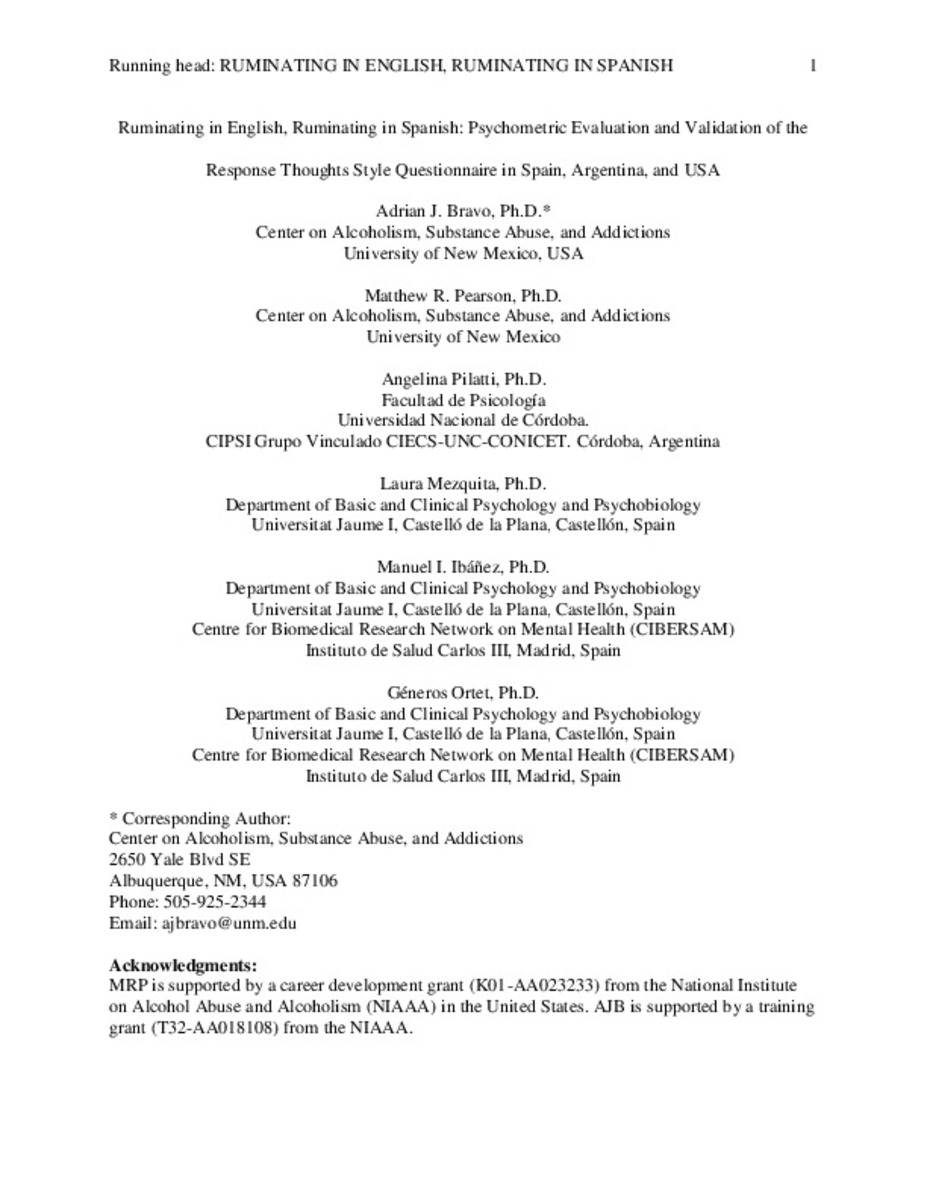Mostrar el registro sencillo del ítem
Ruminating in English, Ruminating in Spanish: Psychometric Evaluation and Validation of the Response Thoughts Style Questionnaire in Spain, Argentina, and USA
| dc.contributor.author | Bravo, Adrián J. | |
| dc.contributor.author | Pearson, Matthew R. | |
| dc.contributor.author | Pilatti, Angelina | |
| dc.contributor.author | Mezquita, Laura | |
| dc.contributor.author | Ibáñez, Manuel I | |
| dc.contributor.author | Ortet, Generós | |
| dc.date.accessioned | 2018-05-17T10:46:16Z | |
| dc.date.available | 2018-05-17T10:46:16Z | |
| dc.date.issued | 2018-03-28 | |
| dc.identifier.citation | BRAVO, Adrián J.; PEARSON, Matthew R.; PILATTI, Angelina; MEZQUITA GUILLAMÓN, Laura; IBÁÑEZ RIBES, Manuel Ignacio; ORTET FABREGAT, Generós. (2018). Ruminating in English, Ruminating in Spanish: Psychometric Evaluation and Validation of the Response Thoughts Style Questionnaire in Spain, Argentina, and USA. European Journal of Psychological Assessment (online 28/3/2018) | ca_CA |
| dc.identifier.uri | http://hdl.handle.net/10234/174722 | |
| dc.description.abstract | The present study aimed to adapt and validate a Spanish version of the Ruminative Thought Style Questionnaire (RTSQ) and test for measurement invariance of the RTSQ across college students in the US, Spain, and Argentina (n = 1,632). Additionally, we examined/compared across these countries, criterion-related (i.e., concurrent) validity of RTSQ factors (i.e., problem-focused thoughts, counterfactual thinking, repetitive thoughts, and anticipatory thoughts) on constructs theoretically-associated with rumination. Consistent with previous findings, we found that a 15-item 4-factor RTSQ provided a more adequate model compared to single-factor CFA models (15- and 20-item versions) in every country. The reliability and validity of the subscales for the Spanish version were satisfactory-to-good in Spain and Argentina. Using multigroup confirmatory factor analyses, we found the 15-item 4-factor version of the RTSQ to be invariant across countries and sex. Bivariate correlations provided evidence for the criterion-related validity of the 4-factor RTSQ across the countries. Our findings suggest that self-report items of the RTSQ convey the same meaning, and that responses to those items load onto the same set of factors, across languages and cultures of administration. Taken together, our findings serve as a foundation for future cross-cultural work testing models in which rumination is a central facet. | ca_CA |
| dc.format.extent | 24 p. | ca_CA |
| dc.format.mimetype | application/pdf | ca_CA |
| dc.language.iso | eng | ca_CA |
| dc.publisher | Hogrefe | ca_CA |
| dc.relation.isPartOf | European Journal of Psychological Assessment (2018), online 28/3/2018 | ca_CA |
| dc.rights.uri | http://rightsstatements.org/vocab/CNE/1.0/ | * |
| dc.subject | Cross-cultural | ca_CA |
| dc.subject | College students | ca_CA |
| dc.subject | Measurement invariance | ca_CA |
| dc.subject | Psychometrics | ca_CA |
| dc.subject | Rumination | ca_CA |
| dc.subject | Sex differences | ca_CA |
| dc.title | Ruminating in English, Ruminating in Spanish: Psychometric Evaluation and Validation of the Response Thoughts Style Questionnaire in Spain, Argentina, and USA | ca_CA |
| dc.type | info:eu-repo/semantics/article | ca_CA |
| dc.identifier.doi | https://doi.org/10.1027/1015-5759/a000465 | |
| dc.relation.projectID | 1) Grant (K01-AA023233) from the National Institute on Alcohol Abuse and Alcoholism (NIAAA) in the United States; 2) Grant (T32-AA018108) from the NIAAA. | ca_CA |
| dc.rights.accessRights | info:eu-repo/semantics/openAccess | ca_CA |
| dc.relation.publisherVersion | https://econtent.hogrefe.com/doi/abs/10.1027/1015-5759/a000465 | ca_CA |
| dc.type.version | info:eu-repo/semantics/publishedVersion | ca_CA |
Ficheros en el ítem
Este ítem aparece en la(s) siguiente(s) colección(ones)
-
PSB_Articles [1294]
Articles de publicacions periòdiques







